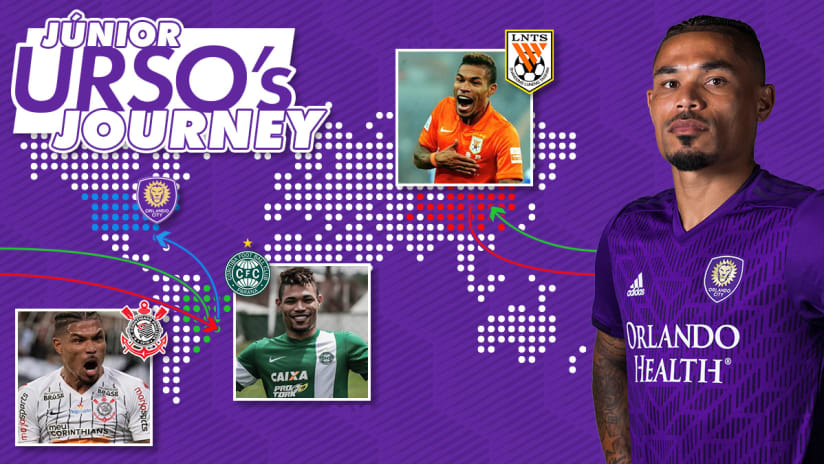From humble beginnings in the shadows of São Paulo, Brazil–”rice with onion was all we had to eat”–Orlando City midfielder Júnior Urso has always done whatever it takes to achieve greatness. Even if that means venturing halfway across the world.
“I consider myself a winner,” Urso said in Portuguese through a translator. “I like to think that I won, because I come from a place where I had nothing, and today I am able to help my family.”
Urso has followed an unconventional path for a Brazilian soccer player, rising through the ranks in his home country before taking a risk and bringing his talents to China. But Urso made good on his bet, adapting seamlessly to a brand new culture and becoming a champion in his first season abroad. His experience and success in China, and his drive to win on and off the pitch, are enormous reasons why Urso finds himself in Orlando today.
-----
In February 2014, Urso faced a crossroads. Then approaching his 25th birthday, the midfielder had played his entire career in his native Brazil, recently finding a home as a regular starter for first division club Coritiba. Coming off perhaps the best season of his career, there was no compelling football reason for Urso to leave Coritiba, much less Brazil altogether. When a proposal from Chinese Super League side Shandong Luneng came to Urso’s attention, his immediate reaction was to decline.
“I didn’t want to go at all,” he said. “I was experiencing a special moment, experiencing a very big growth and evolution in my career.”
But there were circumstances beyond the pitch that beckoned Urso to make a drastic change. “I lived a reality in which I still didn’t have a home of my own,” he recalled. “Nor did my mother have a home of her own. And [Shandong Luneng] offered me exactly that to leave. A roof for my family. I would no longer need to pay rent.”
Urso was recruited to Shandong by Cuca, a 15-year veteran Brazilian manager who had been at the helm of rival Brasileirão side Atletico Mineiro when Urso was at Coritiba. It’s the norm for most global soccer managers, particularly in Brazil, to spend only a couple years at any given club, and despite winning the 2013 Copa Libertadores, Mineiro dismissed Cuca in December 2013 after two-and-a-half seasons in charge. Three days later, he was on his way to China.
With the Chinese transfer window rapidly closing, Cuca had to act quickly to bring in new players. Urso was among those at the top of the list.
“The proposal came on the day the window was going to close,” Urso said. “I went to São Paulo and stayed in a four-hour meeting to get everything settled. Everything was signed by Friday, and on Monday I was on my way to China.”
Shandong Luneng is based in Jinan, whose estimated population of 5.3 million inhabitants ranks just 18th among Chinese cities. Called the “City of Springs” for its 72 natural springs, records of which have been kept for nearly a thousand years, Jinan is not an international megalopolis like Beijing or Shanghai.
“It is a totally Chinese city,” Urso said. “It is not a city of international cuisine, for example. For the first two or three months I was inside the training center. My only outings were to go to the mall, because they had an Italian restaurant.”
As time progressed, Urso began to immerse himself more into the culture of his new home. He joined the rest of the squad on a trip to Mount Taishan, the foremost of the Five Sacred Mountains of China.
“This mountain is frozen at the beginning of the year,” he remembered. “It was a hard way to get to the peak. We got to the top and there were ancient sculptures, made of gold, and various other sacred things. I thought it was amazing, that many years ago, with few resources, people reached such a high place and did all that. For me it was incredible to know something of such importance for the people and their civilization.”

-----
Urso wasn’t alone as he slowly eased into a new culture. Star Brazilian striker Vagner Love had signed for Shandong the previous summer, while Cuca also brought fellow Brazilian Aloíso with Urso at the end of the transfer window. But though he could speak his native Portuguese with his fellow Brazilians, it was a different teammate to whom he was drawn the most.
“In China, I had my first experience of really being alone and living really far from my country, so I wanted to use this opportunity to grow as a human being,” Urso said. “The club provided translators, which was necessary because Mandarin is a very difficult language. But I was always very curious to learn English. If you just wanted to speak Portuguese, it would be easy. But there was also an Australian on the team, Ryan McGowan. He ended up being one of the people I identified with the most.”
McGowan, a central defender, had come to Shandong from Hearts in the Scottish Premier League and was angling for a place in Australia’s 2014 World Cup side. He was the only native English speaker on the roster.
“I was annoying with him,” Urso said, grinning. “He spoke and I repeated. Sometimes, after our conversations, I would go home and repeat again. Other times I went on YouTube to see if I could remember what I learned.”
Urso and McGowan developed a close friendship, and Urso credits the Australian for helping him grow. “After two years of living with him, it ended up helping me a lot. I was able to manage and I was no longer totally dependent on translators. In certain places in China, you can go and speak English. Nowadays, I can communicate in English. It may not be 100% English,” he added wryly, “but people can understand me.”
-----
It didn’t hurt that Urso got off to a flying start on the field.
“Cuca allowed me to start the Chinese Super League opener, and in my first match as a starter, I scored a goal,” Urso said with his big characteristic smile. “The winning goal in the last minute of the game, in fact. I had a good performance, and then I played the rest of the season as a starter.”
Urso helped Shandong to a top-four finish in the 2014 Chinese Super League, spearheading the club’s best defensive record in six seasons with just 29 goals allowed in 30 league games. But Shandong made real in-roads in the Chinese FA Cup, which the club had claimed four times in its history, but not since 2006.
Shandong faced Beijing Guoan, one of the country’s biggest clubs who finished second in the league table, in the quarterfinals. Beijing went ahead early, but Urso’s fellow Brazilian Aloísio brought the game level in the 75th minute. Aloísio, Urso, and McGowan converted the first three penalties for Shandong, and after a save from Shandong keeper and club captain Wang Dalei, Vagner Love finished off the shootout to move the club to the semifinals.
Shandong routed provincial rival Qingdao Huanghai 6-0 over two legs in the semifinals to progress to the final, where they would face Jiangsu Sainty, the eighth-placed club in the league that season. Urso scored a goal and Vagner Love added a hat trick as Shandong galloped to a 4-2 victory in the home leg, leaving the Bear feeling confident.
“We were comfortably going to be champions [going into the second leg],” said Urso. “But when we went to play the away match, Jiangsu scored two goals and held the result until the final moments of the game. It was desperation.”
Due to the away goals rule, Jiangsu were set to lift the trophy. Shandong earned a set piece in the final minute of stoppage time, bringing goalkeeper Wang forward for the last stand.
“The ball was crossed,” Urso said. “[Wang] headed in and missed, but he ended up giving a pass to one of our players, my friend the Australian [McGowan]. He scored the goal and everyone ran onto the field and embraced. It was very special.”
McGowan’s at-the-death winner earned Shandong Luneng a then-record fifth Chinese FA Cup trophy, and it made Júnior Urso a champion in his first year outside his home country.
“In China, people work hard and are not entirely focused on football,” he said, “but they recognize effort. The crowd…I remember I went back there after two years, playing for another team, and they were singing my name. They recognize your effort and are grateful for what you do for them. I’ll keep that memory forever.”

-----
Urso would end up spending four seasons in China–two for Shandong Luneng, and two more for Guangzhou R&F, in one of China’s largest and most international cities.
“Guangzhou was Christmas all year, fully lit,” he recalled. “It has colorful towers. There was even one I had tattooed on my back, to symbolize my trip to China.”
Urso also returned to Brazil twice after leaving, first to Cuca’s former club Mineiro in 2016, and then last season to the legendary Corinthians, where he starred in the team’s triumphant Paulista state league campaign. But when Orlando City came calling, it was only natural for Urso to make the jump to another brand new culture.
“The structure is very big here in Orlando,” said Urso, “similar to the one I found at Corinthians. This is a very special place. I even had the opportunity to become a captain.”
Urso’s English training has continued in Orlando as well, albeit in an unconventional way due to the coronavirus pandemic. “I have been playing a lot of online video games with [Orlando City players] Kamal [Miller] and Benji [Michel], and I have to keep communicating in English. We have all talked a lot.”
Perhaps it was fated that Urso’s long and winding path would take him to Central Florida–long before he inked the tower in Guangzhou on his back, he had a Mickey Mouse tattoo on his arm. He says he intends to get an Orlando Eye tattoo as well once the pandemic has passed.
Now 31, Urso, a legitimate world traveler in the world’s game, is ready for the next adventure.
“In my head, I am always learning,” Urso said. “In China, everything is totally different. I had to adapt to what they were going to give me. I didn’t want to go back to my neighborhood, to my city with my head down and thinking I didn’t make it.
“Defeat doesn’t exist in my head.”





